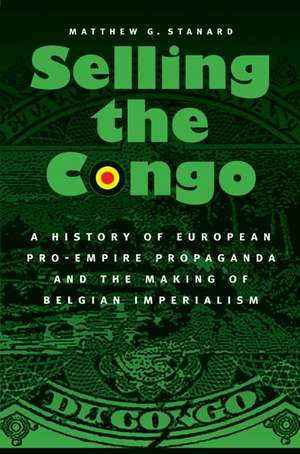Selling the Congo: A History of European Pro-Empire Propaganda and the Making of Belgian Imperialism
Autor Matthew G. Stanarden Limba Engleză Paperback – 31 iul 2015
Belgium was a small, neutral country without a colonial tradition when King Leopold II ceded the Congo, his personal property, to the state in 1908. For the next half century, Belgium not only ruled an African empire but also, through widespread, enduring, and eagerly embraced propaganda, produced an imperialist-minded citizenry.
Selling the Congo is a study of European pro-empire propaganda in Belgium, with particular emphasis on the period 1908–60. Matthew G. Stanard examines the nature of Belgian imperialism in the Congo and considers its case in light of literature on the French, the British, and other European overseas empires. Comparing Belgium to other imperial powers, the book finds that pro-empire propaganda was a basic part of European overseas expansion and administration during the modern period. Arguing against the long-held belief that Belgians were merely “reluctant imperialists,” Stanard demonstrates that in fact many Belgians readily embraced imperialistic propaganda.
Selling the Congo contributes to our understanding of the effectiveness of twentieth-century propaganda by revealing its successes and failures in the Belgian case. Many readers familiar with more-popular histories of Belgian imperialism will find in this book a deeper examination of European involvement in central Africa during the colonial era.
| Toate formatele și edițiile | Preț | Express |
|---|---|---|
| Paperback (1) | 203.03 lei 3-5 săpt. | +26.09 lei 7-13 zile |
| Nebraska – 31 iul 2015 | 203.03 lei 3-5 săpt. | +26.09 lei 7-13 zile |
| Hardback (1) | 465.58 lei 6-8 săpt. | |
| Nebraska – 31 dec 2011 | 465.58 lei 6-8 săpt. |
Preț: 203.03 lei
Nou
Puncte Express: 305
Preț estimativ în valută:
38.85€ • 40.68$ • 32.22£
38.85€ • 40.68$ • 32.22£
Carte disponibilă
Livrare economică 19 martie-02 aprilie
Livrare express 05-11 martie pentru 36.08 lei
Preluare comenzi: 021 569.72.76
Specificații
ISBN-13: 9780803274365
ISBN-10: 080327436X
Pagini: 406
Ilustrații: 10 photographs, 1 chart
Dimensiuni: 152 x 229 x 29 mm
Greutate: 0.59 kg
Editura: Nebraska
Colecția University of Nebraska Press
Locul publicării:United States
ISBN-10: 080327436X
Pagini: 406
Ilustrații: 10 photographs, 1 chart
Dimensiuni: 152 x 229 x 29 mm
Greutate: 0.59 kg
Editura: Nebraska
Colecția University of Nebraska Press
Locul publicării:United States
Notă biografică
Matthew G. Stanard is an associate professor of history at Berry College. His articles have appeared in publications such as the Journal of Contemporary History, French Colonial History, and European History Quarterly.
Cuprins
List of Illustrations
Preface
List of Abbreviations
Introduction
1. The Inheritance: Leopold II and Propaganda about the Congo
2. Denying African History to Build the Belgian Nation: Imperial Expositions
3. Curators and Colonial Control: Belgium's Museums of Empire
4. Educating the Imperialists of Tomorrow
5. Cast in the Mold of the <SC>eic</SC>: The Colony in Stone and Bronze
6. Projected Propaganda: Imperialistic Filmmaking in Belgium
Conclusion
Notes
Bibliography
Index
Preface
List of Abbreviations
Introduction
1. The Inheritance: Leopold II and Propaganda about the Congo
2. Denying African History to Build the Belgian Nation: Imperial Expositions
3. Curators and Colonial Control: Belgium's Museums of Empire
4. Educating the Imperialists of Tomorrow
5. Cast in the Mold of the <SC>eic</SC>: The Colony in Stone and Bronze
6. Projected Propaganda: Imperialistic Filmmaking in Belgium
Conclusion
Notes
Bibliography
Index
Recenzii
"[Selling the Congo is a] fascinating history of Belgium's 20th-century colonial culture."—Martin Rubin, Wall Street Journal
“A welcome addition to studies of the imperial metropole. . . . Written in a clear and very direct style, which makes it accessible to a broad audience, including undergraduates.”—David Ciarlo, American Historical Review
"The breadth of topics covered in this book is wide—each of them could fill a separate monograph. It is to Stanard's credit that he is able to pull them together. . . . Scholars of other European empires seeking to gain comparative knowledge will find this book useful."—Sarah Van Beurden, H-France
"[Selling the Congo is] a useful addition to the growing body of 'end of empire' retrospectives that explore the impact of imperial expansion on the social imaginary of the European population."—Crawford Young, The Historian
"[Selling the Congo contributes] to a broader understanding of the impact of colonialism on colonial powers."—Geert Castryck, H-Net
"Matthew Stanard's Selling the Congo looks to expand our view of European colonial culture and consider the new understandings of empire in a different context, that of Belgian imperialism and pro-empire propaganda."—Elizabeth Stice, H-Empire





